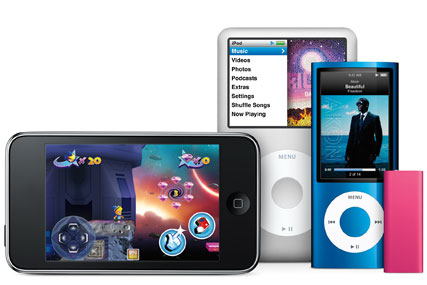If cannibalising sales of your own products is the cardinal sin of marketing, Apple is a prime offender. There is little doubt that the design-led technology company could be a victim of its own success.
The phenomenal success of the iPhone has been at the expense of its iPod portable media players. As smartphones, including Apple's iPhone, offer communications and entertainment in a single device, sales of standalone players will, inevitably, have suffered. Yet, it could have been worse: compared with other parts of the technology market, there has been relatively little development in the standalone iPod space over the past six months.
However, recent media frenzy surrounding the iPad has put the focus on the cannibalisation issue once again. Nevertheless, many analysts believe the vast difference in size of the iPod and iPad provide a distinct value proposition, so the iPad will have less impact on the iPod than the iPhone.
The iPad has also created a halo effect that Apple could potentially use to reinvent the iPod. Apple's iPod army is not defecting en masse to rival products, so Apple can be credited with keeping pace with the demands of its consumers.
Is innovation enough, or is it time Apple refocused on its core product? We asked Hugo Feiler, managing director of Grey London, which works with Samsung, and a former Sony marketer, and Chris Quigley, managing partner of Rubber Republic, which has worked with Polaroid and Sony PlayStation, how Apple might solve its cannibalisation conundrum.
HUGO FEILER, MANAGING DIRECTOR, GREY LONDON
Does cannibalisation actually matter? Apple's success has not been the result of sticking dogmatically to one product, but rather in remaining innovative and customer-focused.
There is no doubt that iPod has been phenomenally successful over the past 10 years. For a product to maintain such a dominant lead over the competition for such a long time is an achievement in any industry, but to do so in consumer electronics is truly awe-inspiring.
In truth, iPod is only half the story. It was not iPod that created true revolutionary change (MP3 players had been around for some time); it was the iTunes proprietary operating system, which drives the machine, provides the brilliant consumer experience and now has evolved to power both iPhone and iPad.
To Apple, a decline in iPod sales is neither a critical issue nor unexpected; its ambitions and internal measurement of success lie well beyond its ability to create a state-of-the-art portable listening device.
In the Boston Matrix, maybe the iPod has become a cash cow to exploit as it fades, and that means finding cost-effective ways to do so.
REMEDY
- Reduce price of downloads for new purchasers for a limited period. A simple and effective incentive to purchase iPod by offering real and measurable consumer value.
- Give the product for free but have a monthly subscription to iTunes. A new purchase mechanism similar to the model used by the telecoms industry.
- Reposition iPod as a starter Apple for young kids - a sort of cooler DS. Launch a pack with pre-installed games to build Apple's credentials as a quality low-cost gaming brand.
CHRIS QUIGLEY, MANAGING PARTNER, RUBBER REPUBLIC
Our attention spans are getting shorter. Fact. Short is sweeter; multi-use is better than single-use; new beats old; everything's disposable, especially technology.
So does this picture necessarily assign the iPod to the technology trash can? Not really. The good news for the iPod is that it's not only its sales that have been shrinking in recent years, but also its physical size, and I think it's in its Nano format that its future lies.
Markets shift rapidly, especially when it comes to the tech scene, so Apple needs to shift its positioning, focusing it on smaller niche uses, rather than the broad '1000 songs in your pocket' positioning, which has put it in competition with pretty much every MP3, phone and portable computer device on the market.
Play to the urban gym bunnies who take their iPod Nano with them. Play to the music hipsters who worship the purity of the single device, and who would happily make space for a music-laden Nano in their skinny jeans.
Play to female fashionistas who need some way of transferring their daily dose of Dolly Parton on the go from their Hindmarch handbag to their home.
REMEDY
- Think small, not big. Focus on the Nano, rather than its bigger brother (which clashes too much with the iPhone). Shrink positioning to more of a niche play.
- Focus on innovation and evolution. Look at how else the iPod could integrate into life activities and devices, such as through clothing.
- Listen and learn. Maybe think about co-creation, and seeing how to get users more involved in future product development.



